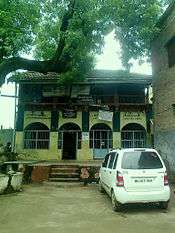Local government in Maharashtra
 |
| This article is part of a series on the politics and government of India |
|
|
Local govt. in Maharashtra State follows the general structure of Local Governance in India and is broadly classified into two categories: Urban Local Governance and Rural Local Governance.
Urban Local Governance
Urban local governance can be classified as either by Municipal Corporation or by Municipal Council.
Municipal Corporations
Large urban areas are governed by Municipal Corporations (also called just Corporations). The area under each Corporation is further divided up into Wards. An individual ward or collection of wards within a corporation sometimes have its own administrative body called a Ward Committee.
There are 27 Municipal Corporations in Maharashtra, as follows:
| Rank | City | District | Established | Grade | Population (2011) |
|---|---|---|---|---|---|
| 1 | Mumbai | Mumbai City District, Mumbai Suburban District |
1888 | A Plus | 11,914,398 |
| 2 | Pune | Pune | 1950 | A | 3,115,431 |
| 3 | Nagpur | Nagpur | 1951 | A | 2,405,421 |
| 4 | Thane | Thane | 1982 | B | 1,818,872 |
| 5 | Pimpri-Chinchwad | Pune | 1982 | B | 1,729,359 |
| 6 | Nashik | Nashik | 1982 | B | 1,486,973 |
| 7 | Kalyan-Dombivli | Thane | 1982 | C | 1,246,381 |
| 8 | Vasai-Virar | Palghar | 2009 | C | 1,221,233 |
| 9 | Aurangabad | Aurangabad | 1982 | C | 1,171,330 |
| 10 | Navi Mumbai | Thane | 1992 | C | 1,119,477 |
| 11 | Solapur | Solapur | 1964 | D | 951,118 |
| 12 | Mira-Bhayandar | Thane | 2002 | D | 814,655 |
| 13 | Bhiwandi-Nizampur | Thane | 2002 | D | 711,329 |
| 14 | Amravati | Amravati | 1983 | D | 646,801 |
| 15 | Nanded-Waghala | Nanded | 1997 | D | 550,564 |
| 16 | Kolhapur | Kolhapur | 1972 | D | 549,283 |
| 17 | Panvel | Raigad | 2016 | D | 509,901 |
| 18 | Ulhasnagar | Thane | 1998 | D | 506,937 |
| 19 | Sangli-Miraj & Kupwad | Sangli | 1998 | D | 502,697 |
| 20 | Malegaon | Nashik | 2003 | D | 471,006 |
| 21 | Jalgaon | Jalgaon | 2003 | D | 460,468 |
| 22 | Akola | Akola | 2001 | D | 427,126 |
| 23 | Latur | Latur | 2011 | D | 382,754 |
| 24 | Dhule | Dhule | 2003 | D | 376,093 |
| 25 | Ahmednagar | Ahmednagar | 2003 | D | 350,905 |
| 26 | Chandrapur | Chandrapur | 2011 | D | 321,036 |
| 27 | Parbhani | Parbhani | 2011 | D | 307,191 |
Municipal councils
Smaller urban areas are governed by Municipal councils or Municipal Boards (also called just Municipalities). Municipalities are further subdivided into Wards, which may be grouped together into Ward Councils. One or more corporators are elected to represent each ward. There are 226 municipalities in Mahaharashtra.
Rural Local Governance
Rural governance in India is based on the Panchayati Raj system. It is a three tier system, with the Zilla Parishad at the district level, Blocks at the middle level and Village Council at the lowest level. It is govern under the Maharashtra Zilla Parishads and Panchayat Samitis Acts 1961' act of Maharashtra State.[1]
Zilla parishad
Zilla Parishad (commonly known as ZP) is a local government body at the district level in India. It looks after the administration of the rural area of the district and its office is located at the district headquarters.
There are 34 Zilla Parishads in Maharashtra which are as follows.
- Thane Zilla Parishad
- Palghar Zilla Parishad
- Raigad Zilla Parishad
- Ratnagiri Zilla Parishad
- Sindhudurg Zilla Parishad
- Nashik Zilla Parishad
- Dhule Zilla Parishad
- Nandurbar Zilla Parishad
- Jalgaon Zilla Parishad
- Ahmednagar Zilla Parishad
- Pune Zilla Parishad
- Satara Zilla Parishad
- Sangli Zilla Parishad
- Solapur Zilla Parishad
- Kolhapur Zilla Parishad
- Aurangabad Zilla Parishad
- Jalna Zilla Parishad
- Parbhani Zilla Parishad
- Hingoli Zilla Parishad
- Beed Zilla Parishad
- Nanded Zilla Parishad
- Osmanabad Zilla Parishad
- Latur Zilla Parishad
- Amravati Zilla Parishad
- Akola Zilla Parishad
- Washim Zilla Parishad
- Buldhana Zilla Parishad
- Yavatmal Zilla Parishad
- Nagpur Zilla Parishad
- Wardha Zilla Parishad
- Bhandara Zilla Parishad
- Gondiya Zilla Parishad
- Chandrapur Zilla Parishad
- Gadchiroli Zilla Parishad
Panchayat samiti
Panchayat samiti is a local government body at the Tehsil or Taluka level in India. It works for the villages of the Tehsil or Taluka that together are called a Development Block. The Panchayat Samiti is the link between the Gram Panchayat and Zilla Parishad.
There are 355 panchayat samitis or block panchayats in Maharashtra.
Gram panchayat

Gram panchayats are local self-government bodies at the village level. They are a cornerstone of the panchayati raj system. A gram panchayat can be set up in villages with a population of more than five hundred. There is a common gram panchayat for two or more villages if the population of these villages is less than five hundred, whereupon it is called a group-gram panchayat.
There are 28,813 gram panchayats in Maharashtra.[2]
Elections
After every five years, Maharashtra State Election Commission conducts elections in all local bodies.[3]
References
- ↑ "Maharashtra Zilla Paris hads and Panchayat Samitis Act 1961" (PDF). Govt of India, Ministry of Panchayat Raj. Retrieved 9 December 2015.
- ↑ - Panchayat raj Portal
- ↑ "SEC Milestones". Archived from the original on 2 Aug 2012. Retrieved 16 March 2013.
Economic Survey of Maharashtra 2014-15